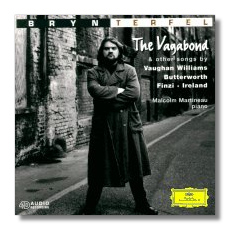
The Internet's Premier Classical Music Source
Related Links
-
Butterworth Reviews
Finzi Reviews
Ireland Reviews
Vaughan Williams Reviews - Latest Reviews
- More Reviews
-
By Composer
-
Collections
DVD & Blu-ray
Books
Concert Reviews
Articles/Interviews
Software
Audio
Search Amazon
Recommended Links
Site News
 CD Review
CD Review
Bryn Terfel

The Vagabond and other Songs
- Ralph Vaughan Williams: Songs of Travel
- Gerald Finzi: Let Us Garlands Bring
- George Butterworth:
- Bredon Hill and Other Songs
- Six Songs from "A Shropshire Lad"
- John Ireland:
- Sea Fever
- The Vagabond
- The Bells of San Marie
Bryn Terfel, baritone
Malcolm Martineau, piano
Deutsche Grammophon 445946-2
I almost never climb on the bandwagon first, so it took me a while to buy this CD. Even then, I waited for a sale. I had heard Terfel, but usually in "walk-ons" and before he had reached his current star status. My impressions were vaguely beneficent, but I had no fix on his musicianship.
I can see why people make such a to-do. The voice itself is yummy. Nevertheless, I feel extremely protective of the repertoire he's chosen, and I don't feel he performs it all that well. To be fair, most singers, even native speakers, don't know how to sing in English. They certainly don't study it. After all, hardly any classical singer makes a career singing in English (or French, or Russian, or Spanish, for that matter), so why should one bother acquiring a difficult skill? And, indeed, the skill takes much thought, experience, and practice. If only Sinatra could have written down what he knows.
Still, composers - especially the ones here - have, in the face of negligence and neglect, continued to turn out beautiful songs. Terfel has certainly chosen well. Vaughan Williams, Finzi, and Butterworth are represented by some of their best stuff. The Ireland has tightly clung to a nice little niche in the baritone repertory.
Terfel sins against the flesh in three main ways - two are the usual traps and the third is one he's found all by himself. First, he's extremely careless in the matter of final consonents. Vaughan Williams' "I have trod the upward and the downward slopes," for example, becomes "I have trod the upward and the downward sloes" (as opposed to the mangoes; clean your boots). Even though I know the texts, I often find Terfel's diction unintelligible, or rather hovering at the edge of intelligibility. Second, Terfel doesn't impress me as a reader of poetry. He gives what he believes the important words a little shot, sort of like an elbow nudge in your ribs. Unfortunately, apparently on the principle that one shouldn't miss an opportunity, every other word becomes "important." After a while, your ribs get sore. I relate this to a larger problem: Terfel can't find the dramatic persona of the poems. This results in weird vocal behavior. In Vaughan Williams' "The Roadside Fire," he takes an unfortunate "walking on eggshells" approach to the vocal line, which, given the weight of his voice, reminds me of the ballerina hippo in Disney's Fantasia. In Finzi's "Come away, come away, death," he takes a sudden drop in dynamics on "Oh, prepare it!" for no good interpretive reason. It comes off as a vocal stunt or as Interpretation with a capital I, calling attention to itself and the singer's vocal prowess rather than illuminating the text. Just because you can do something, doesn't mean you should.
The third is something I've never heard Terfel do in, say, German repertoire, so I have no idea whether this is an emerging bad habit or just his problems with singing in his native language. As a matter of fact, it's two bad habits. The first is to aspirate vowels at Times of Great Emotion, which for Terfel is just about all the time. The second is a quick little portamento (scoop) upwards at the beginning of words. If there's a behavioral pattern here, I've yet to find it. It reminds me a bit of Pavarotti's fitting everything he sings to some private notion of Operatic Style. With Terfel, it's some crochet of song Interpretation. Thus, the final stanza of Butterworth's "Oh fair enough are sky and plain"
But in the golden sanded brooks
And azure meres I spy
A silly lad that longs and looks
And wishes he were I.
becomes
But in the (scoop)go-holden sa-handed (scoop)brooks
And azure (scoop)meres I sp-hy
A silly (scoop)lad that (scoop)l-hongs and l-hooks, etc.
And that's just one stanza. Of course, this sort of cutting up plays havoc with the phrase, besides its sheer nuisance value.
Malcolm Martineau plays beautifully and without laughing.
For an idea of how this repertoire should be done, try Benjamin Luxon's Vaughan Williams CD (Chandos CHAN8475) or John Shirley-Quirk's recital of English songs (Saga EC 3339-2).
Copyright © 1996, Steve Schwartz


















